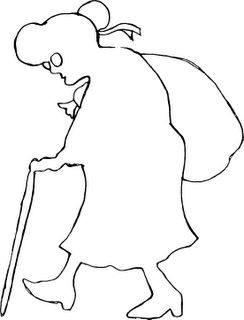We need to draw a line in the sand and resist bullying tactics by the American Civil Liberties Union, Americans United for the Separation of Church and State, American Atheists and other leftist organizations that intimidate school and government officials by spreading misinformation about Christmas. Celebrating Christmas is constitutional!The O’Reilly Factor program from Nov. 21, 2005 featured a debate in its “Impact” segment:
JOHN KASICH, GUEST HOST: [T]he campaign to defend Christmas[] is being led by Reverend Jerry Falwell. Other religious leaders and legal scholars have mobilized promising to file lawsuits and organize boycotts against individuals, schools, government institutions and businesses who discriminate against the upcoming Christian holiday.The ACLU, Americans United for the Separation of Church and State, Freedom from Religion Foundation, and People for the American Way are particularly demonized as being enemies of Christianity. The Alliance Defense Fund [ADF], a Christian right legal outfit co-founded by the late Dr. Bill Bright, the late Larry Burkett, Dr. James Dobson, Dr. D. James Kennedy, and the late Marlin Maddoux, is providing free legal advice and guidelines for those who fight what they believe are restrictions on their religious freedom. Do they really believe the free exercise of their religious beliefs must necessarily infringe on those of other religions? These concerns of an attempted chokehold on Christian expression aren’t fully borne out by the evidence. As Michelle Goldberg noted on salon.com,
Okay—in the secularized Christian world, Christmas is more important than Easter, yet in the Church Year, which goes from Advent (what’s that???) through Easter and Pentecost, Easter holds primacy. It is Easter that gives meaning to Jesus’ birth. I’ve seen no such battle over repression of Easter displays. Americans, even those of the religious right, evidence no such strong emotional ties to Easter. No nefarious plot needs to exist, as even Christians have sent Easter to the minor leagues. So how does all this relate to the ad that I quoted at the beginning? It seems that the focus of Christian expression is on being able to exchange greetings of “Merry Christmas,” sing “Hark the Herald Angels Sing” in secular settings, set up a crèche in front of City Hall. The Christian right promises boycotts of anything that threatens those expressions. Would they see the Cadillac commercial as a threat, a bullying tactic? At the very least, the ad should be offensive to those who follow the Jesus who was all about bringing the widowed and orphaned, the poor and the marginalized into full relationship with the Father. Should we try to make Cadillac stop those ads? What is Christian expression anyway? I have Jewish, Hindi, Muslim, nominal Christian and agnostic (and maybe atheistic) co-workers. In this country, they need not have my Christianity thrown in their faces as something to which they should adhere, just as I need not adopt their credos. The Baptismal Covenant in the Book of Common Prayer asks, “Will you seek and serve Christ in all persons, loving your neighbor as yourself? Will you strive for justice and peace among all people, and respect the dignity of every human being?” An expression of Christianity that would respect the dignity of every human being would be reaching out to and helping those on the margins, the helpless who are so vulnerable to famine, hurricane, earthquake, war, disease. I really don’t see how saying “Merry Christmas” fulfills the Covenant.Despite [Mike Johnson, senior legal counsel for ADF]’s lamentations, one can in fact offer Christmas greetings without legal counsel. Christmas trees are permitted in public schools. (They’re considered secular symbols.) Nativity scenes are allowed on public property, although if the government erects one, it has to be part of a larger display that also includes other, secular signs of the holiday season, or displays referring to other religions. (The operative Supreme Court precedent is 1984’s Lynch v. Donnelly, where the Supreme Court ruled 5-4 that a city-sponsored Christmas display including a crèche, reindeer, a Christmas tree, candy-striped poles and a banner that read “Seasons Greetings” was permissible. “The display is sponsored by the city to celebrate the Holiday and to depict the origins of that Holiday,” the majority wrote. “These are legitimate secular purposes.”) Students are allowed to distribute religious holiday cards and literature in school. If the administration tries to stop them, the ACLU will step in to defend the students’ free-speech rights, as they did in 2003 when teenagers in Massachusetts were suspended for passing out candy canes with Christian messages. … The myth of the war on Christmas has two parts. The first… charges that department stores are trying to replace the celebration of Jesus’ birthday with some secularized, universal winter holiday season, a switch encompassed by the godless greeting “Happy Holidays.” The second asserts that the ACLU and other groups like the Anti-Defamation League and People for the American Way are trying to ban public Christmas displays. Like all conspiracy theories, there are a few grains of truth at the center of it—some schools, in an overzealous attempt to promote inclusiveness, have taken silly steps like renaming their Christmas trees “friendship trees.” Some have indeed infringed on religious students’ First Amendment rights. Weaving these stories together, the myth of the war on Christmas claims that the ACLU has forced Christmas into hiding, and that Christians must therefore battle to reclaim their rightful place in the culture. “Those who would ban Christmas and Christians should not mistake the signs on the horizon,” writes [Fox News anchor John] Gibson in “The War on Christmas[: How the Liberal Plot to Ban the Sacred Christian Holiday Is Worse Than You Thought].” “The Christians are coming to retake their place in the public square, and the most natural battleground in this war is Christmas.”
